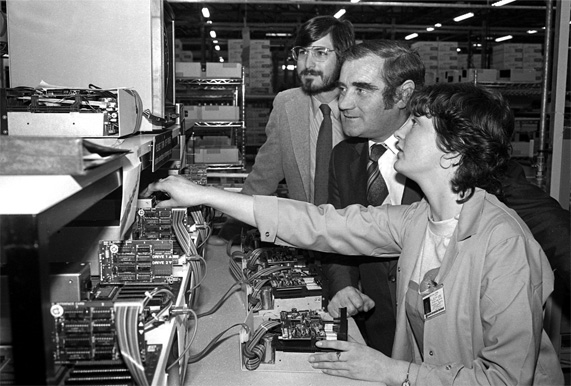APPLE STATEMENT
November 6, 2017
The facts about Apple’s tax payments
Apple believes every company has a responsibility to pay its taxes, and as the largest taxpayer in the world, Apple pays every dollar it owes in every country around the world. We’re proud of the economic contributions we make to the countries and communities where we do business.
We’re presenting the facts on this page in response to reporting by the International Consortium of Investigative Journalists. Among the inaccuracies in these reports:
- The changes Apple made to its corporate structure in 2015 were specially designed to preserve its tax payments to the United States, not to reduce its taxes anywhere else. No operations or investments were moved from Ireland.
- Far from being “untouched by the United States,” Apple pays billions of dollars in taxes to the US at the statutory 35 percent rate on investment income from its overseas cash.
- Apple’s effective tax rate on foreign earnings is 21 percent — a figure easily calculated from public filings. This rate has been consistent for many years.
Last month, in response to questions from the ICIJ, the New York Times and others, Apple provided the following statement:
“The debate over Apple’s taxes is not about how much we owe but where we owe it. As the largest taxpayer in the world we’ve paid over $35 billion in corporate income taxes over the past three years, plus billions of dollars more in property tax, payroll tax, sales tax and VAT. We believe every company has a responsibility to pay the taxes they owe and we’re proud of the economic contributions we make to the countries and communities where we do business.
Under the current international tax system, profits are taxed based on where the value is created. The taxes Apple pays to countries around the world are based on that principle. The vast majority of the value in our products is indisputably created in the United States — where we do our design, development, engineering work and much more — so the majority of our taxes are owed to the US.
When Ireland changed its tax laws in 2015, we complied by changing the residency of our Irish subsidiaries and we informed Ireland, the European Commission and the United States. The changes we made did not reduce our tax payments in any country. In fact, our payments to Ireland increased significantly and over the last three years we’ve paid $1.5 billion in tax there — 7 percent of all corporate income taxes paid in that country. Our changes also ensured that our tax obligation to the United States was not reduced.
We understand that some would like to change the tax system so multinationals’ taxes are spread differently across the countries where they operate, and we know that reasonable people can have different views about how this should work in the future. At Apple we follow the laws, and if the system changes we will comply. We strongly support efforts from the global community toward comprehensive international tax reform and a far simpler system, and we will continue to advocate for that.”
More Information About Apple’s Tax Payments
Throughout its history, Apple has designed new products — and established entirely new industries — by focusing on innovation. That hard work and dedication has led to the creation of revolutionary products and services that have profoundly improved people’s lives and created millions of jobs around the world.
Taxes for multinational companies are complex, yet a fundamental principle is recognized around the world: A company’s profits are taxed based on where value is created. The Organisation for Economic Co-operation and Development, Ireland, the United States and others all agree on this principle.
1. Apple is the largest taxpayer in the world, paying over $35 billion in corporate income taxes in the last three years. Apple pays taxes in every country where we sell our products.
When a customer buys an Apple product outside the United States, the profit is first taxed in the country where the sale takes place. Then Apple pays taxes to Ireland, where Apple sales and distribution activity is executed by some of the 6,000 employees working there. Additional tax is then also due in the US when the earnings are repatriated.
Apple’s worldwide effective tax rate is 24.6 percent, higher than average for US multinationals.
2. The vast majority of the value in Apple products is created in the United States, where design, development, engineering work and more are accomplished. So under the current international tax system, the majority of Apple taxes are owed to the US.
In a white paper last year, the US Treasury expressed concern over European regulators’ attempts to tax money that is owed to the US. “To the extent that such foreign taxes are imposed on income that should not have been attributable to the relevant Member State, that outcome is deeply troubling, as it would effectively constitute a transfer of revenue to the EU from the US government and its taxpayers.”
3. Apple has cash overseas because that’s where it sells the majority of its products. Under the current tax system, post-tax earnings from foreign sales are subject to US tax. Apple has earmarked more than $36 billion to cover US deferred taxes. This is in addition to the $35 billion the company paid in corporate income taxes over the past three years.

4. Apple has been operating in Ireland since 1980 when Steve Jobs looked for a base to expand outside the US. The facility in Cork, Ireland started with 60 employees and now has over 6,000. Apple’s innovation and investment supports a further 12,000 jobs across Ireland. And across Europe, Apple supports more than 1.5 million jobs.
When Ireland changed its tax laws in 2015, Apple made changes to its corporate structure to comply. Since then, all of Apple’s Irish operations have been conducted through Irish resident companies. Apple pays tax at Ireland’s statutory 12.5 percent.
As part of these changes, Apple’s subsidiary which holds overseas cash became resident in the UK Crown dependency of Jersey, specifically to ensure that tax obligations and payments to the US were not reduced. Since then Apple has paid billions of dollars in US tax on the investment income of this subsidiary. There was no tax benefit for Apple from this change and, importantly, this did not reduce Apple’s tax payments or tax liability in any country.
5. Apple believes comprehensive international tax reform is essential, and for many years has been advocating for simplification of the tax code. Reform that allows a free flow of capital will accelerate economic growth and support job creation. A coordinated legislative effort internationally will remove the current tug of war between countries over tax payments and ensure certainty of law for taxpayers.
Read Fortune’s independent explanation of Apple’s tax payments and how they illustrate the complexity of the international tax system.
Images of Apple’s facility in Cork, Ireland


